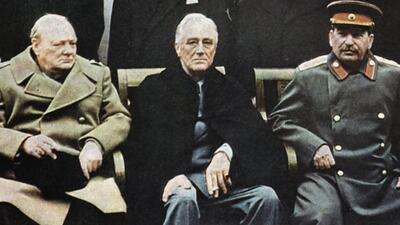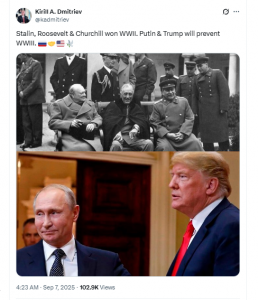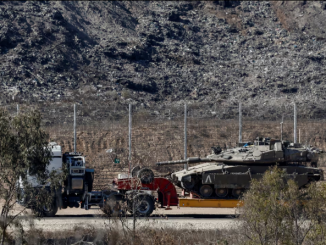
Published September 8, 2025
Kremlin negotiator Kirill Dmitriev sparked global attention after declaring on X that Presidents Vladimir Putin and Donald Trump will “prevent World War III.” Drawing a bold historical comparison, he wrote, “Stalin, Roosevelt & Churchill won WWII. Putin & Trump will prevent WWIII.” Dmitriev insisted that dialogue and mutual respect between the two leaders were the path to peace, countering critics such as former U.S. ambassador Michael McFaul who have questioned Trump’s engagement with the Kremlin. His statement comes at a delicate moment, with Moscow sending mixed signals: while Dmitriev and Putin have stressed openness to talks on Ukraine and nuclear arms control, senior figure Dmitry Medvedev has warned that “WW3 has already begun” and even suggested preemptive strikes against the West. This dual messaging reflects both Russia’s internal divisions and its external strategy of combining diplomacy with threats. In the West, skepticism remains high. Retired U.S. General Ben Hodges cautioned that treating Putin like a partner risks repeating the mistakes of appeasement, potentially paving the way for wider conflict. Despite the rhetoric of peace, real progress depends on whether Trump and Putin can move beyond symbolic gestures to concrete agreements. For now, Dmitriev’s dramatic proclamation underscores the high stakes of U.S.–Russia relations at a time when the world is already on edge.
👥 Public/Political Reactions
-
Kremlin Optimism: Dmitriev emphasized that Putin and Trump together could avert a world war, presenting dialogue as a victory for diplomacy.
-
Russian Contradictions: Medvedev’s fiery claim that “WW3 has already begun” contradicted Dmitriev’s peace narrative, revealing sharp divides in Moscow’s leadership tone.
-
Western Critics: Michael McFaul and other U.S. diplomats dismissed the statement as political theater, warning against legitimizing Putin.
-
Military Caution: Ret. Gen. Ben Hodges compared trusting Putin to appeasing Hitler, warning it could actually trigger a wider conflict.
-
Public Opinion: Trump supporters saw the declaration as proof of his unique negotiating power, while opponents argued it was Kremlin spin aimed at shaping Western sentiment.

⚠️ Resulting Effects
-
Heightened Global Attention: Dmitriev’s statement drew worldwide focus on Trump–Putin ties, amplifying the idea that their relationship could shape the path to war or peace.
-
Increased Kremlin Propaganda Value: Moscow used the message to project an image of Putin as a stabilizer, while still allowing Medvedev’s threats to keep Western nations uneasy.
-
Western Policy Caution: U.S. and European leaders reinforced commitments to Ukraine and NATO defense, unwilling to risk concessions based on Kremlin rhetoric.
-
Public Division: Supporters of Trump pointed to the remarks as proof of his peace-making potential, while critics accused Russia of trying to manipulate Western public opinion.
-
Strategic Uncertainty: The mix of peace overtures and war threats left global markets, diplomats, and military planners bracing for unpredictable developments in U.S.–Russia relations.
🔮 Future Outlook
-
Potential Trump–Putin Engagement: Direct talks could open space for negotiations on Ukraine, nuclear arms control, and de-escalation, though substance remains uncertain.
-
Mixed Russian Messaging: The contrast between Dmitriev’s peace tone and Medvedev’s war rhetoric suggests the Kremlin may continue using both diplomacy and threats as leverage.
-
Western Skepticism: U.S. and European leaders are unlikely to embrace Putin as a partner without verifiable commitments, keeping sanctions and military aid to Ukraine in place.
-
Risk of Miscalculation: Optimistic dialogue paired with aggressive threats raises the danger of misinterpretation, potentially heightening global tensions instead of easing them.
-
Geopolitical Stakes: If Trump and Putin can demonstrate tangible progress, it could stabilize U.S.–Russia relations temporarily; failure, however, may reinforce fears of escalation toward global conflict.
🧩 Bottom Line:
Despite loud warnings from Western elites and military critics, the possibility of peace through strong leadership and direct dialogue cannot be ignored. Dmitriev’s declaration reflects a reality that many dismiss too quickly: only firm statesmen willing to negotiate from a position of strength can steer the world away from catastrophic conflict. The constant calls for confrontation by establishment voices risk escalating tensions, while the partnership of Trump and Putin presents a pragmatic path toward stability. Instead of framing every diplomatic gesture as appeasement, the West should recognize that true peace requires dialogue—even with rivals. In the end, it is not endless sanctions or saber-rattling that will prevent World War III, but leaders who prioritize results over ideology.
SOURCES: ZEROHEDGE – Kremlin’s Top Negotiator Declares Putin & Trump “Will Prevent WW3”
THE UK SUN – DEAL WITH THE DEVIL Trump must not make deal with ‘Hitler’ Putin – trusting two-faced tyrant could spark World War 3, says US ex-general





Be the first to comment